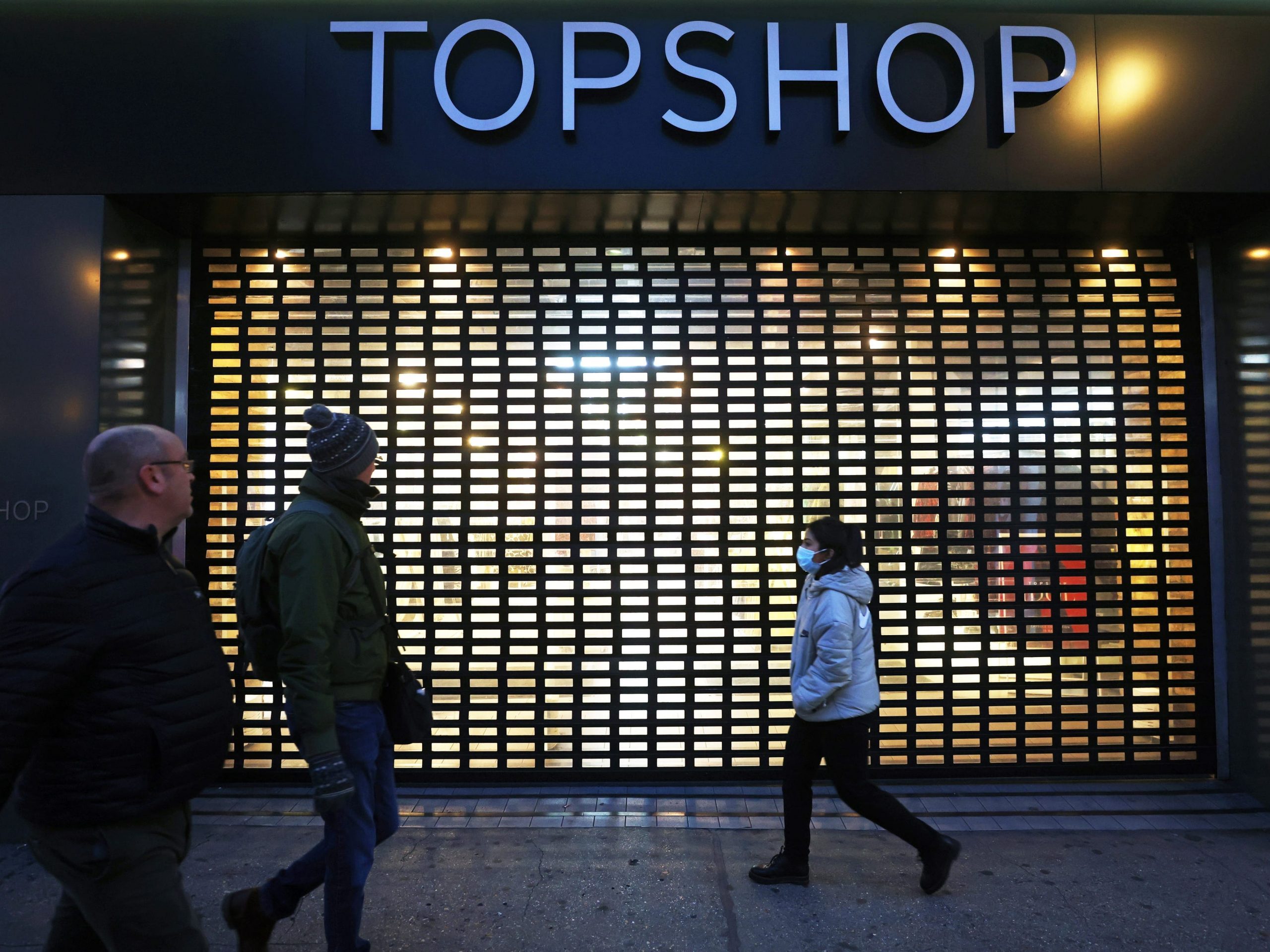
- The Arcadia Group, which owns British fashion brands including Topshop, Dorothy Perkins, and Miss Selfridge, has fallen into administration, Deloitte confirmed Monday night.
- This puts more than 13,000 jobs at risk, though no redundancies have been announced yet.
- The company’s CEO said COVID-19 was to blame. The pandemic has caused Arcadia’s stores to close in two national lockdowns.
- But rival fast fashion retailers were already attracting the Arcadia Group’s customers before the pandemic.
- Visit Business Insider’s homepage for more stories.
British tycoon Philip Green’s Arcadia fashion group has collapsed into administration, putting more than 13,000 jobs at risk and becoming the country’s biggest corporate casualty of the COVID-19 pandemic so far.
Deloitte said late on Monday it had been appointed Arcadia’s administrator and would seek buyers for the group’s brands: Topshop, Topman, Dorothy Perkins, Wallis, Miss Selfridge, Evans, Burton and Outfit.
Arcadia’s close to 500 stores would continue to trade, its online platforms would remain operational, and supplies to concession partners would continue, Deloitte said.
No redundancies were being immediately announced, it added.
Green acquired Arcadia for £850 million ($1.14 billion) in 2002.
He had no immediate comment, but his CEO laid the blame for Arcadia's demise firmly on the pandemic.
"In the face of the most difficult trading conditions we have ever experienced, the obstacles we encountered were far too severe," said Ian Grabiner.
Apparel is one of retail sectors hit the most by the pandemic. Arcadia's brands have been hit by two national lockdowns, which forced non-essential businesses, including clothing stores, to shut, alongside falling demand for footwear and formal clothing.
Senior British minister Michael Gove said it was "tragic" but that mistakes had been made by management.
"I'm not going to criticise any individual but there's been a lot of reporting that points out some of the missteps that have been made by the management there," he told Sky News Tuesday.
While COVID-19 lockdowns pushed Arcadia over the edge, it has struggled in recent years, underinvesting and failing to keep pace with competitors in an increasingly online retail sector.
Its brands were squeezed between the likes of Inditex's Zara, H&M, and Primark, and online-only players ASOS and Boohoo.
"Arcadia's brands have been slow to diversify into other countries or to make an exciting online offering and have not kept pace with the contemporary fashion offerings of the online-only competitors," Dr Gordon Fletcher, a retail expert from the University of Salford Business School, told Business Insider.
Arcadia's share of the UK clothing market has slumped to 2.7% in 2020 from 4.5% in 2015, according to figures GlobalData shared with Business Insider.
A restructuring deal was approved by creditors last year, cutting rents and closing stores, but proved only a temporary respite.
Sale process
"We will be rapidly seeking expressions of interest and expect to identify one or more buyers to ensure the future success of the businesses," said Matt Smith, Deloitte's joint administrator.
Mike Ashley's Frasers Group said on Monday it was interested in participating in any Arcadia sale process.
Topshop, once the go-to destination for teenagers and fashion lovers, is regarded by analysts as Arcadia's most attractive asset.
Media reports have also identified Marks & Spencer, Next, and Boohoo, as well as private equity players, as potential bidders for individual brands. All three companies declined to comment.
Arcadia's collapse could have a knock-on impact on the future of department store chain Debenhams, which is already in administration and employs 12,000.
Arcadia is one of Debenhams' biggest concession holders.
Pension funds deficit
Arcadia's workforce also faces uncertainty over a deficit in the company's pension fund, estimated by analysts at about £350 million ($470 million).
As part of last year's restructuring, Arcadia agreed to provide £210 million ($281 million) of security over property assets to the pension schemes, while Tina Green, Philip's wife and the ultimate owner of Arcadia, agreed to contribute £100 million ($134 million) to the schemes over three years.
"Philip Green should do the right thing and fill the Arcadia pension deficit," said opposition Labour Party leader Keir Starmer.
If Green does not pay up, Arcadia's 10,000 pension scheme members should still receive the bulk of their entitlement through the government's lifeboat scheme, the Pension Protection Fund.
British Business secretary Alok Sharma said the administrators had three months to file a report on the conduct of Arcadia's directors with The Insolvency Service, which will determine whether a full investigation is required.
Philip Green
Much of the group's controversy comes from its chairman, Sir Philip Green. The business tycoon paid out a £1.2 billion ($1.6 billion) dividend to his wife, who is Arcadia's registered owner, just three years after he bought the group for £850 million ($1.1 billion).
Green also owned the department store chain British Home Stores, which he infamously sold for just £1 ($1.33) in 2015. The chain went bankrupt the next year in the UK's biggest retail collapse since 2008, causing the closure of 163 stores and the loss of around 11,000 jobs.
In June 2019, Green was charged with four counts of misdemeanor assault after a fitness instructor reportedly accused him of unwanted groping in Arizona. Just months before that, a member of the UK parliament named him as the subject of several sexual harassment, racial abuse, and bullying allegations.
